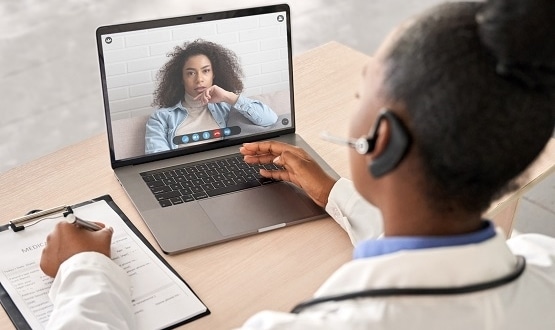RCGP tech manifesto calls for prioritisation of joined-up IT systems
- 2 May 2019

The Royal College of GPs (RCGP) is calling for the joining up of IT systems across the NHS to be prioritised as part of its technology manifesto.
The All Systems GP document, published on 30 April, recognises the potential that genomics, AI, digital medicine and robotics has to improve patient care and safety, but adds this can only be achieved once all areas of the NHS have access to computer networks which link up the patient journey.
The manifesto states it wants all GP practices to have:
- modern, digitally-enabled premises with fully interoperable IT systems
- access to secure high-speed broadband facilities
- access to a single shared electronic patient record which documents patient interactions throughout the NHS
Professor Helen Stokes-Lampard, chair of the RCGP, said: “GPs have always embraced new technology. General practice was the first NHS sector to have electronic prescribing and electronic patient records so we know how beneficial new technology can be and we recognise its huge potential to help our patients.
“GPs want the latest, cutting-edge tech at our disposal but we need the basics to work first. That means everything from making sure that our computers don’t crash while issuing a prescription, to making sure our systems talk to those in all hospitals so that we can improve the care and experience that our patients receive throughout the NHS.
“We want the NHS to be a world leader in technology, and we are ready for a new wave of exciting opportunities which have the potential to revolutionise patient care, but a lot of work is needed before that can happen, and we need to ensure sure that these opportunities are embraced safely and sustainably with GPs at the centre of changes.”
The manifesto was launched at an event at the RCGP’s London headquarters.
On the same day health secretary Matt Hancock announced all hospitals and GP practices will soon have access to the fastest fibre optic broadband under new government plans.
Hancock said the upgrade would support a promise made in the NHS Long Term Plan to improve the range and access of digital healthcare services.





7 Comments
Richard, if Matt has an IT background, he is hiding it well. He is talking technology as a solution to communications problems when the real issue is communications processes. Many of the situations I allude to in previous comments all had what appeared to be super-duper technology but no processes to follow as to who contact who about what and how, plus the recording of these communications for post-analysis in the event of serious issues. I have contacted several medically inclined people who know IT and they all agree that technology is a tool to implement processes designed by ‘users’, in this case clinicians. Matt does not have ‘processes’ in his vocabulary and has charged into his task like a gunman in a saloon, blasting away with a shotgun without a known target. See below for some info on this;
‘The importance of the process point of view is not restricted to a specific enterprise sector. In the field of health, as a result of the nature of the service offered, health institutions’ processes are also the basis for decision making which is focused on achieving their objective of providing quality medical assistance. In this chapter the application of business process modelling – using the Business Process Modelling Notation (BPMN) standard is described. Main challenges of business process modelling in healthcare are the definition of healthcare processes, the multi-disciplinary nature of healthcare, the flexibility and variability of the activities involved in health care processes, the need of interoperability between multiple information systems, and the continuous updating of scientific knowledge in healthcare.’
“Business Process Modeling in Healthcare”
https://www.researchgate.net/publication/230747712_Business_process_modeling_in_healthcare
Matt should have made his ‘fast draw’ more slowly and run a SWOTs on the NHS problems first. I believe that his ‘technology push’ will turn out to be a solution to which there is no problem but that won’t bother him; he will have moved on before the stuff ‘hits the fan’, as it always does. If you read his analysis of the new Ten Year Plan it is full of phrases which to an IT veteran are HUGE jobs, covered in phrases of the kind; ‘ensure full interoperability of future NHS systems. This type of phrase appears regularly in the 15 or so NHS ‘Plans’ that I have listed in a document. The other common factor in them is that they produced NOTHING, except for NPfIT which produced a £12 bn loss. We have had reports on the ‘paperless NHS by 2018’, now rewritten as 2020 and similar fiction; what betting man would put money on the latest ‘plan’ for the NHS succeeding? Try your local bookmaker after showing him my paper,
List of these ‘plans; available from me at tcritchley07 at gmail. dot com . you will see what I mean.
Terry and Clive, thanks for your support. The silly thing is that the comms and interoparability technology standards have been there for decades, but the will to implement them has not been there. So all we have is a few cosy groups of hospitals and GPs who can communicate with each other with some difficulty, but if you live on the boundaries of these groups, as I do, you are in trouble. (I am told that oop North, things are better, and interactivity rules across a wider area.)
I ask Terry not to knock Matt Hancock, He has an IT background, unlike his predecessors. What he calls for is better communication, not just tech for the sake of tech.
I hate to brag, but my 2p comes from 66 years in IT (it was called data processing when I started). In my early years, computers were not commercially available. It was electromechanical, not electronic. In those days, DP was a to solve tangible business and scientific problems, (or a few years earlier, breaking German code) not plaster everything with shiny tech. We started with the application, not the tech.
So I get impatient with young chaps who are wrapped up in the tech, and fail to sort out the uses first.
Richard, I can give you a score of similar examples from my own NHS experience; fortunately in relatively minor areas. However, they do show that communications in the NHS is a BIG problem and will NOT be solved by throwing technology at it (a.k.a. Hancock’s Mantra) unless it is subservient to a defined communications workflow, which is comprised of PROCESSES for each major element of NHS work.
The NHS seems incapable of defining the problem to which ‘shiny, new’ technology is the solution. You will NEVER solve a problem without getting at the root cause. A problem can be defined as something that prevents you achieving an objective hence, no objective, no problem, only a perception that things aren’t quite right.
However, these issues will not be solved until Matt H and his team read these and other comments on other NHS aspects, especially those from people at the NHS coal face. My 2p is based on experiencing the NHS, reading what is said about it and 50 years in IT.
Terry and Richard are correct. The sad fact is that tech and data should be empowering the NHS to offer a more even service across the whole of the UK, but actually it is having the opposite affect and as a techie and a patient that makes me Xtremely angry. The politicians come and go, it is down to our national NHS leaders to make much more noise about this but they keep quiet, shame on them. I do not wish to be negative but what is needed NOW more than ever is truth.
Indeed it would be nice to see “a single shared patient record. ” It was the main promise of Connecting for health back in 2004.
Sadly my current experience of treatment at four hospitals of two dangerous conditions shows me that passing my data seamless;y and instantaneously between these hospitals still does not happen, after 15 years.
I am surprised that the RCGP has taken so long to realise that something needs to be done. As a patient, my treatment is being jeopardised up by the 15-year delay in providing adequate communication between the bits of the NHS which treat me.
I have another grumble about the RCGP’s manifesto. It shows no plans for the patients to see their patient record. I thought that the NHS was supposed to be patient centric. I was delighted, five years ago when I could see my allergies and medications on my EMIS record. It is quite nice to see my test results, but disappointed that these results are only those done at the GP’s surgery, not those from the local hospitals. As a result, the record is actually misleading.
What the RCGP should realise is that making a manifesto is not enough. It will have to drag secondary care IT kicking and screaming into the 21st century. Hospital trusts are culturally deeply non-interoperable, and will fight you all the way.
This latest ‘Long Term Plan’ is one of about 15 other NHS ‘futures’ documents, most promising the earth but delivering precisely nothing (I can list them if necessary). The statement about needing ‘joined up IT systems’ sounds simple but represents a huge task which, quite frankly, NHS Digital and its advisors are not up to. Witness the NPfIT debacle as an attempt to get a single source of patient data.
What is needed before anything is committed is the definition by the end users (clinicians) of their medical processes and which data is needed to fulfil them. Then, and only then, can technology be employed to support that medical process environment. Matt Hancock is bypassing this key stage and going straight for the TECHNOLOGY which will turn out (as it always does) to be a ‘solution to which there is no DEFINED problem’.
I’ve been there and seen it over half a century in IT and the result is always the same; confusion, dissatisfaction, punishment of the innocent and promotion of the guilty (plus another study document leading to another ‘Long Term Plan’).
This is one approach but there are an awfull lot of nodes to join up … 100s of thousands in real time ? Might make more sense for the NHS NOT to put all its eggs in one basket (NPfIT). I know this thought is against the general flow but … How about integrating data @ the national level using a standard national data model ?
Comments are closed.